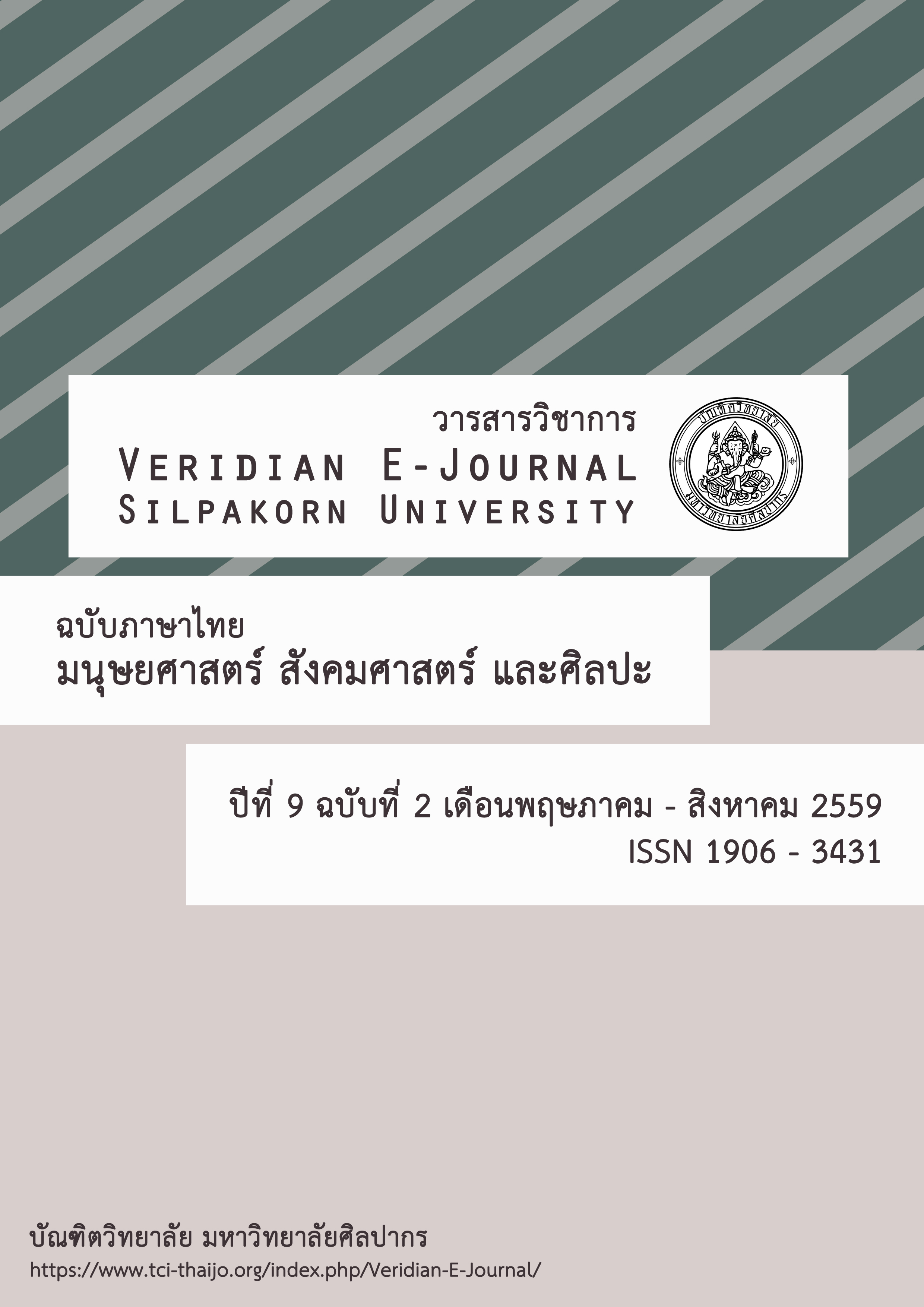ปัจจัยที่ส่งผลต่อการรับรู้ประโยชน์ การใช้งาน และความพึงพอใจของผู้ใช้งานระบบการจัดการความรู้ในโรงพยาบาลรัฐบาล
Main Article Content
Abstract
การวิจัยนี้มีวัตถุประสงค์ (1) เพื่อศึกษาปัจจัยที่มีอิทธิพลต่อการรับรู้ประโยชน์ของการนำการจัดการความรู้ไปใช้ อันได้แก่ 1) วัฒนธรรมองค์การ 2) ภาวะผู้นำ 3) การศึกษา การอบรม และการพัฒนา 4) โครงสร้างองค์การ 5) เทคโนโลยี 6) การประเมินผล 7) การให้รางวัล 8) กระบวนการการจัดการความรู้ 9) การสื่อสารความรู้ เป็นตัวแปรอิสระของการศึกษาครั้งนี้ (2) เพื่อศึกษาปัจจัยที่มีอิทธิพลต่อการใช้งานระบบการจัดการความรู้ ได้แก่ การรับรู้ประโยชน์ของการนำการจัดการความรู้ไปใช้ เป็นตัวแปรตามในการศึกษา (3) เพื่อศึกษาปัจจัยที่มีอิทธิพลต่อความพึงพอใจของผู้ใช้งานระบบการจัดการความรู้ ได้แก่ การรับรู้ประโยชน์ และการใช้งาน เป็นตัวแปรตามในการศึกษา
ผู้วิจัยทำการวิจัยแบบผสมวิธี การวิจัยเชิงคุณภาพเป็นการสัมภาษณ์เจาะลึก โดยใช้การลดทอนข้อมูล และการวิเคราะห์สรุปอุปนัย ส่วนการวิจัยเชิงปริมาณ เป็นการวิจัยเชิงสำรวจ ใช้แบบสอบถามเป็นเครื่องมือในการเก็บรวบรวมข้อมูลจากเจ้าหน้าที่ที่ทำงานด้านการจัดการความรู้ในโรงพยาบาลรัฐบาล จำนวน 412 คน สถิติที่ใช้ในการวิเคราะห์ข้อมูล ไดแก การแจกแจงความถี่ การหาค่าร้อยละ การหาค่าเฉลี่ย การหาค่าส่วนเบี่ยงเบนมาตรฐาน และการวิเคราะห์ถดถอยพหุ
ผลการวิจัยพบว่า (1) โครงสร้างองค์การมีอิทธิพลทางบวกต่อการรับรู้ประโยชน์ของการนำการจัดการความรู้ไปใช้ (2) การประเมินผลมีอิทธิพลทางบวกต่อการรับรู้ประโยชน์ของการนำการจัดการความรู้ไปใช้ (3) กระบวนการการจัดการความรู้มีอิทธิพลทางบวกต่อการรับรู้ประโยชน์ของการนำการจัดการความรู้ไปใช้ (4) การสื่อสารความรู้มีอิทธิพลทางบวกต่อการรับรู้ประโยชน์ของการนำการจัดการความรู้ไปใช้ (5) การรับรู้ประโยชน์ของการนำการจัดการความรู้ไปใช้มีอิทธิพลทางบวกต่อการใช้งานระบบการจัดการความรู้ (6) การรับรู้ประโยชน์ของการนำการจัดการความรู้ไปใช้มีอิทธิพลทางบวกต่อความพึงพอใจของผู้ใช้งานระบบการจัดการความรู้ และ (7) การใช้งานระบบการจัดการความรู้มีอิทธิพลทางบวกต่อระดับความพึงพอใจของผู้ใช้งานระบบการจัดการความรู้
The objectives of this research were (1) to study the influence of 1) organizational culture, 2) leadership, 3) education, training and development, 4) organizational structure, 5) technology, 6) evaluation, 7) award, 8) knowledge management process, and 9) knowledge dissemination on perceived usefulness of Knowledge Management adoption is independent variables of this study; (2) to study the influence of perceived usefulness of Knowledge Management adoption on Knowledge Management system usage is dependent variables of this study and (3) to study the influence of perceived usefulness of Knowledge Management adoption and Knowledge Management system usage on user satisfaction is independent variables of this study is independent variables of this study.
The researcher used mixed method research methodology. Qualitative research used in-depth interview, used data reduction and analytic induction techniques. Quantitative research involved exploratory research. The instrument of research was a questionnaire used to collect data from 412 staffs who worked in the government hospital and had related work to knowledge management. The statistics used in data analysis were frequency, distribution, percentage, mean, standard deviation and multiple regression analysis.
It was found that: (1) organization structure had positive and direct influence on perceived usefulness of Knowledge Management adoption, (2) evaluation had positive and direct influence on perceived usefulness of Knowledge Management adoption, (3) knowledge management process had positive and direct influence on perceived usefulness of Knowledge Management adoption, (4) knowledge dissemination had positive and direct influence on perceived usefulness of Knowledge Management adoption, (5) perceived usefulness of Knowledge Management adoption had positive and direct influence on Knowledge Management system usage, (6) perceived usefulness of Knowledge Management adoption had positive and direct influence on user satisfaction, and (7) Knowledge Management system usage had positive and direct influence on user satisfaction.
